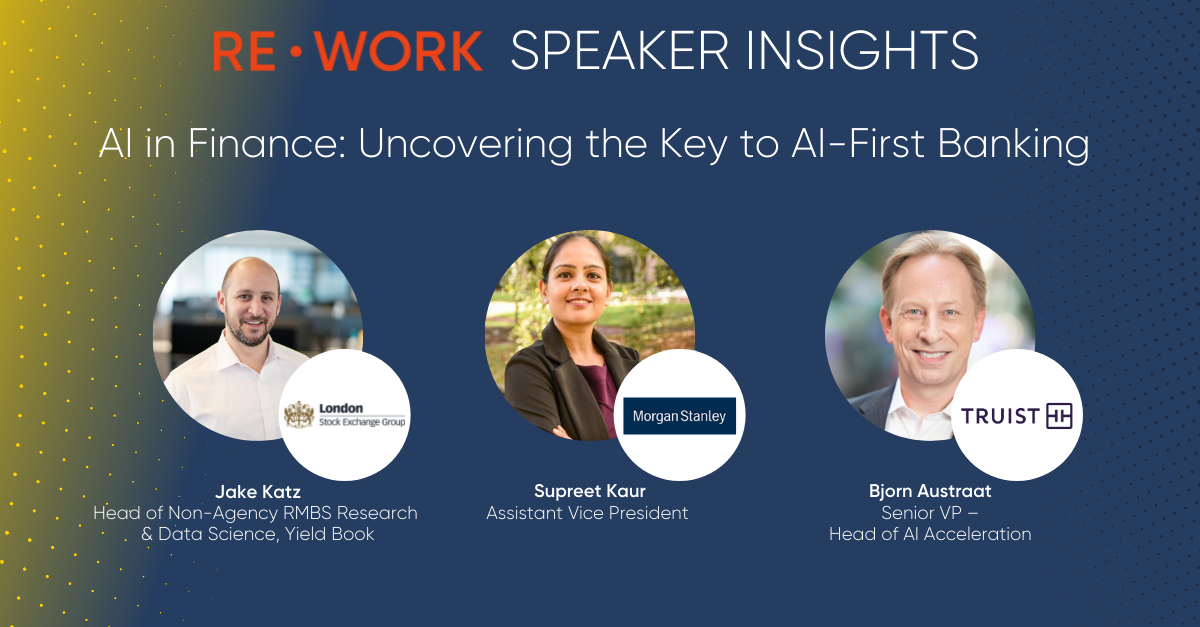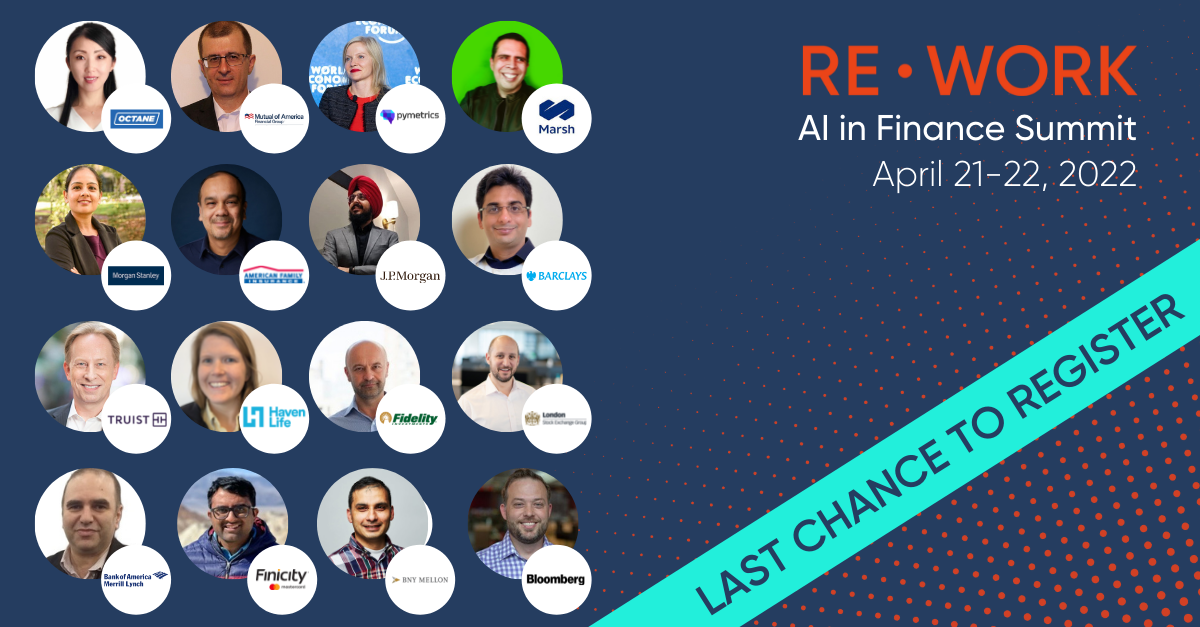AI is increasingly changing the way organizations are driven, so much so that within the next decade PwC estimates AI will add $15.7 trillion to the global economy.
So, ahead of RE•WORK’s upcoming AI in Finance Summit in New York on April 21-22, we asked some of our expert speakers about their approach to successfully implementing AI at the forefront of their organizations.
For the full summit overview, download the brochure here.

Bjorn Austraat, Senior VP – Head of AI Acceleration, Truist
What are the models that everyone should be deploying?
There really is no ‘one size fits all’ list of models. Depending on an organization’s needs, I’d suggest prioritizing models that have a clear, measurable benefit, that directly improve customer or teammate experience and that reduce risk across all categories. As a good starting point I like to ask the following question: “Whose life is going to get better, by how much, and how do we know that?” This question covers a broad set of key success criteria including a user-centric viewpoint, a well-thought out benefits statement and a view towards the ultimate deployment of the AI/ML solution in the larger organizational context.
What are the main challenges that the FinTech Industry is facing; how can we manage these?
A rapidly evolving regulatory context combined with generational shifts in expectations when it comes to seamlessness, convenience, ubiquity and multi-channel integration. It’s been said that “the last best experience that customers have anywhere, becomes the minimum expectation for the experience they want everywhere.” So banks (and everyone, really) compete not only with FinTechs and ‘TechFins’ but also with Starbucks, Netflix, Amazon and Uber.
How are you building a more AI-driven organization?
By enabling safe and compliant, high-velocity AI/ML innovation using end-to-end ModelOps platforms, synthetic data, and modern, robust policies and processes.
Supreet Kaur, Assistant Vice President
What are the models that everyone should be deploying?
The choice of model is dependent on the data in hand, resources, and the business problem that you are trying to solve. The recommendation is to always start with vanilla ML models and then build advanced AI models as they are computationally expensive.
What are the main challenges that the FinTech Industry is facing; how can we manage these?
In my opinion, a key challenge faced by industry is the security and privacy of data. Most of the consumer data contains sensitive information that need to be stored and masked in a way to protect the privacy of the customers. But some of this information might be a critical feature in the ML model. Storing such information on cloud and masking the private attributes can be helpful. These attributes can be made available to a few key folks of the company.
How are you building a more AI-driven organization?
There are many ways to inculcate AI in the key decision-making process. A few of them that apply to all companies are leveraging all the data available in some shape or form by building an innovation lab where dedicated folks can analyze data and build use cases, the last one is to build the trust of the AI results amongst senior leadership through explainable AI models.
Jake Katz, Head of Non-Agency RMBS Research and Data Science, Yield Book, London Stock Exchange
What are the models that everyone should be deploying?
Models and specifications have become quite customized to particular classes of problems. It’s great that we now have sophisticated solutions offering superior results around predictive lift and data insights. Each specialization has its own workhorse model of choice. Data exploration and patience around understanding the data generation process remain a key challenge regardless of the specific model or discipline. For example, each data point may matter even bad values which teach you about how the data is collected, processed, and often misprocessed. Many practitioners don’t invest in this level of ownership and that leads to problems downstream no matter how sophisticated an algorithm you deploy.
What are the main challenges that the FinTech Industry is facing; how can we manage these?
Big data platform configuration remains too costly and time consuming. Also, porting data between systems and solutions is often clunky, cumbersome, and prone to breaking.
How are you building a more AI-driven organization?
Carefully and slowly. I’ve learned stakeholders and champions are as important as solutions. My organization is becoming more AI accepting because we’ve painstakingly showcased POCs and prototypes that are solution focused around our current challenges.

Want to learn more from these experts? Check out their sessions at the AI in Finance Summit in the agenda here.
--> For the full summit overview, download the brochure here.
Join pioneering AI and ML data practitioners as well as industry leaders to discuss the key AI challenges, trends and opportunities in 2022 and beyond. Benefit from a unique event experience filled with thought-provoking presentations and panel discussions from industry leaders and meaningful networking opportunities with your peers.
The AI in Finance Summit is also running alongside the AI in Insurance and AI in Regtech Summits. Attendees can join sessions across all 3 tracks with just one ticket. Pass prices will increase on April 9 so, for a $200 saving book your ticket here by midnight Friday April 8.
For more information contact [email protected].
